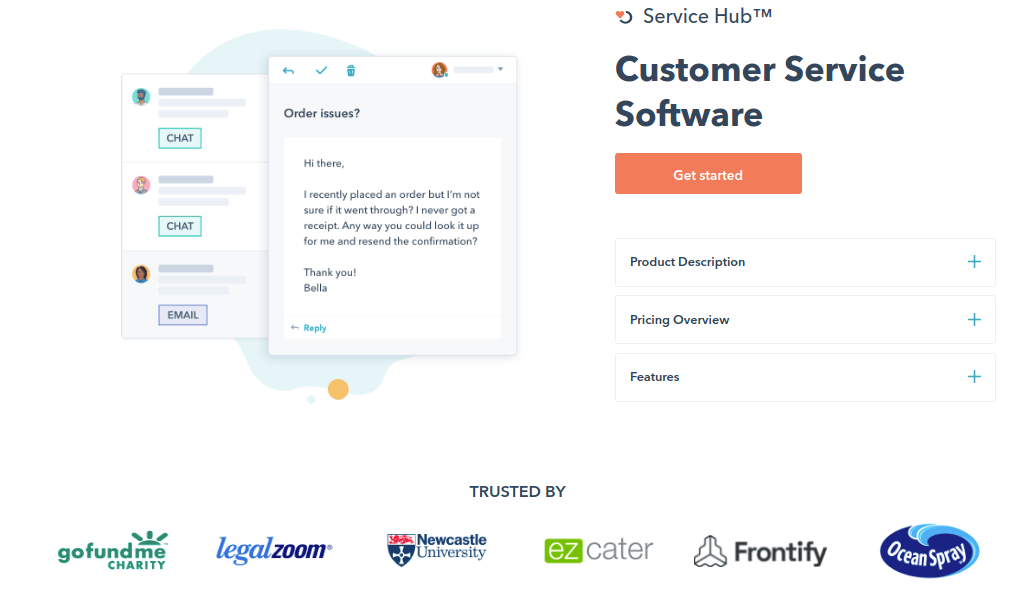“When you have two alternatives, the first thing you have to do is to look for the third that you didn’t think about, that doesn’t exist.”- Shimon Peres
Zendesk alternatives—That’s the only reason you have landed on this article, right? I know you’re conducting online research on bestselling Zendesk alternatives and I am going to lend you my helping hand in it.
Agreed that Zendesk is a robust and reliable cloud-based help desk management solution, but it might not be the best customer support solution for every business, project manager, or team.
That said, choosing a customer service tool for your business is not a walk in the park, right? All your crucial customer data will be stored in this tool, and hence you need to make the best choice.
It’s not like you can randomly pick a seemingly good customer support tool, try it, and change it if you are not satisfied with the tool. It takes a lot of time, money, and resources to migrate all your customer data from one customer service tool to another.
Zendesk is a name that immediately pops up in your mind when you think of a well-established and reliable customer service solution. The tool offers a wide range of features and numerous integrations, which makes it a preferred customer service solution for many businesses.
Now, the thing is that while Zendesk has its pros, it’s not without its cons. The drawbacks are quite big ones, which necessitates the need to look for the best Zendesk alternatives available in the market.
So, let’s dig deeper and understand Zendesk, its limitations, and the best alternatives that are good enough to replace this tool.
Table of Contents
What Is Zendesk?
Zendesk is a useful cloud-based customer service solution that enables businesses to seamlessly manage customer inquiries and service requests across different channels.
Founded in 2007, Zendesk offers an “all-in-one” customer support solution for organizations in the form of a unified tool that offers Support, Guide, Chat, and Talk. The tool is flexible and scales as your business grows.
That was the upside side of using Zendesk.
Now we shall talk about the limitations of this tool and help you find other powerful Zendesk alternatives packed with extensive features.
Why There’s a Need To Look For Zendesk Alternatives?
Zendesk is widely used, but it’s not the go-to customer support tool for every organization. Let’s take a look at key areas where the tool seems to be losing out when compared to other Zendesk alternatives.
High recurring costs
Zendesk is a SaaS solution that requires customers to subscribe to its paid plans, and its plans are on the expensive side. It’s not an affordable solution that’s for sure, especially for businesses and teams with a limited budget. Zendesk plans start at $49/agent/month and can go as high as $215/agent/month. Many businesses would want to use more pocket-friendly Zendesk alternatives that can get the job done with features that are more or less the same.
Data export problems
Many users have faced challenges while exporting data from Zendesk. There are no options to export data directly into a JSON or CSV file, and you might have to take a developer’s help to export data. The export API of Zendesk requires you to write a code to extract data.
A long list of features are not required by everyone
Zendesk offers a long list of advanced features and functionality so much so that the tool has seemingly reached the saturation point. Many small companies end up paying for features they do not even use in the first place. Also, too many features poorly integrate with each other, and can easily overwhelm your customer service operations.
Lack of control over customers’ data
The control of customers’ data is always with Zendesk as it’s a SaaS-based system, so you are likely to not have complete control over your customers’ data in a third-party setup. Zendesk servers store all the crucial data, which cannot be termed as “safe” when you talk about data control. Even if you delete your Zendesk account, it’s possible your customers’ data may not be deleted from its database.
Basic plans lack important features
If you are using the basic plan of Zendesk then you do not get access to important customer service features, like a self-service customer portal, AI-powered knowledge management, customizable ticket layouts, multilingual support and content, customizable and shareable dashboards, etc.
“Why use different tools and shell out more money when you can have all tools in a single location at prices your pocket won’t mind at all? Switch to all-in-one ProofHub ASAP!”
What Features Should Be There In The Best Zendesk Alternatives?
So, you’ve gone through some glaring limitations of Zendesk. Now it’s time to have a look at some features that should be there in alternatives to Zendesk you’re looking for.
The reason why I have listed these features here is that in your search for a worthy competitor to Zendesk, you’re likely to come across many tools that will be packed with features. This can leave you overwhelmed and confused.
The features listed below will help you shortlist top Zendesk alternatives based on a set of features they offer. You will find it easy to determine which alternative offers most of these features that will help you and your team to offer unparalleled customer support.
Let’s take a look at some essential features that should be there in any competitor to Zendesk you consider.
- Unlike the complex and overwhelming interface of Zendesk, the alternative to Zendesk should have an easy-to-use, intuitive interface that can be used with the help of a minimal learning curve.
- Zendesk doesn’t offer a shared inbox, but a top Zendesk competitor should offer this essential feature to its users, which will allow multiple customer support agents to access your support email accounts
- The tool should offer affordable pricing plans unlike Zendesk, which can be considerably expensive for organizations with limited time and resources in hand.
- The tool should offer 24/7 access to your customer support team so that customer queries can be answered without delays.
- The tool should offer core helpdesk features, like ticketing, multichannel support, automation capabilities, customer service reports, etc.
- The tool should offer analytics and reporting capabilities so that you can track individual and team performance, customer satisfaction, and monitor the overall progress.
11 Most Popular Zendesk Alternatives Available Today
Now we’ve arrived at the crux of this article, i.e. 11 of the best alternatives to Zendesk for businesses, project managers, and individuals. Let us move forward and analyze every single one of these alternatives to Zendesk. Please note that all 11 customer support tools mentioned below offer both “must-have” and “add-ons” features to be considered as worthy Zendesk substitutes.
Let’s get started!
1. Freshdesk
Freshdesk counts amongst top-rated Zendesk substitutes available today, which offers you Omni-channel, bots, and self-service solutions for customer service. Freshdesk is trusted by more than 40,000 companies to offer top-notch customer service through a list of powerful features. You can streamline your company’s customer support and collaborate with multiple teams to divide, assign, and resolve customer queries in the least amount of time. You can combine multiple channels on a single dashboard and amaze customers with an omnichannel support experience.
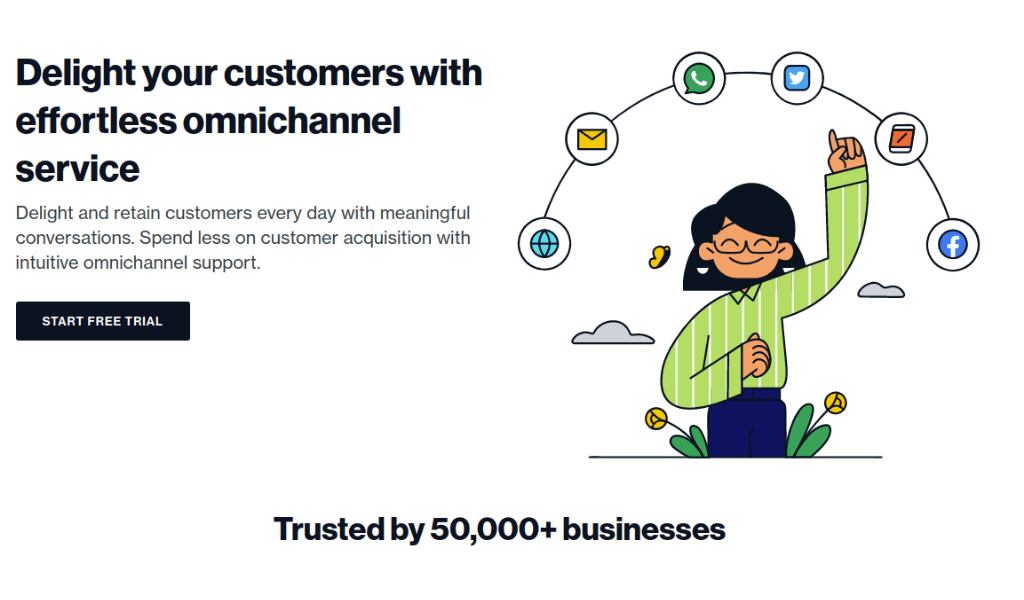
Features:
- Ticketing
- Collaboration
- Multi-channel helpdesk
- Automation
- Self Service
- Reporting and Analytics
- Customizations
Pros:
- Incredibly easy to use minimalistic interface
- A robust tool that is packed with innovative features
- Regularly updated as per market trends
- Minimum technical glitches
- Support customers across multiple platforms like phone, email, chat, call, social media, and other messaging apps
- Extensive team collaboration features
Cons:
- Limited customization
- Complicated and overwhelming to use
- Expensive plans
- Limited automation and rules
Pricing: The Sprout plan is for free. The Blossom plan is priced at $15/agent/month, billed annually. The Garden plan is priced at $35/agent/month, billed annually. The Estate plan is priced at $49/agent/month, billed annually. The Forest plan is priced at $99/agent/month, billed annually.
Reviews:
“The number of standard features missing from a standard inbox is really disappointing – such things as being able to send to multiple recipients, saving drafts and the search function.”- Capterra
“Even if you have never used a Help Desk before you would still be able to navigate FreshDesk with ease.”- G2
2. Helpjuice
Helpjuice is a top-rate alternative to Zendesk because it offers users a complete value for money package. Helpjuice is a cloud-based knowledge base management solution that focuses specifically on the creation and management of external and internal management bases that can be used by both customers and employees. The software is suitable for businesses of all sizes, across various industries. Helpjuice enables simultaneous internal editing of knowledge base documents, which means that multiple agents can remotely collaborate to edit a single document at a time.
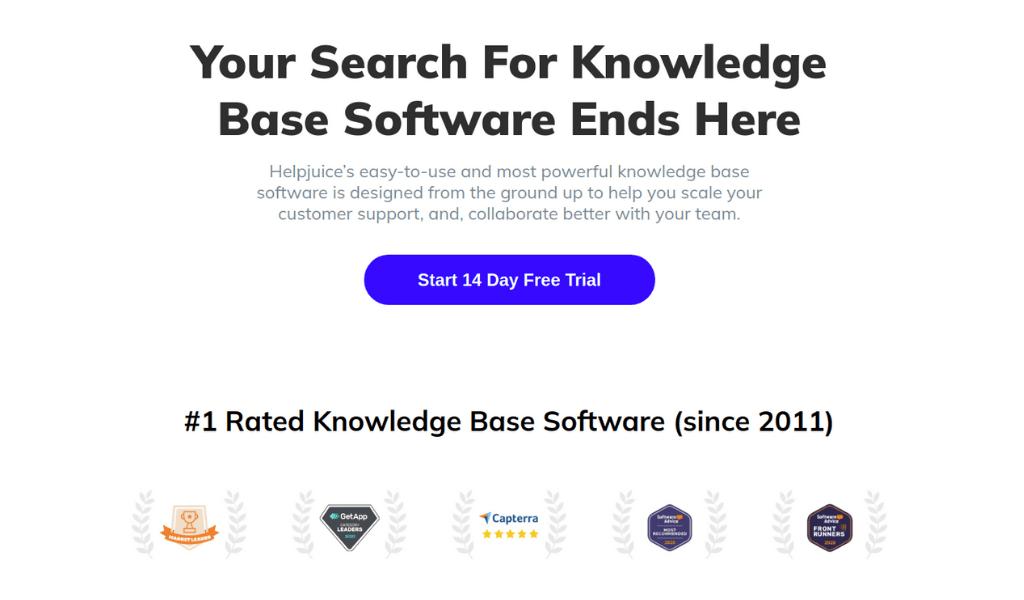
Features:
- Intelligent analytics
- Excellent customization
- Amazing integrations
- Instant Google-like search
- Supports PDF and even content searching images
- Editor/authoring
- Multiple languages
Pros:
- Agents can tag and categorize documents as appropriate
- UI is intuitive, user-friendly, and customizable
- Centralized knowledge repository
- Auto-updates
- Self-service portal
- Data management
- Visual analytics
- Set user permissions
Cons:
- Expensive pricing plans
- Limited features
- Steep learning curve
Pricing: The Starter plan is priced at $120/4 users, the Run-up plan is priced at $200/16 users, the Premium Limited plan is priced at $289/60 users, and the Premium Unlimited plan is priced at $369/unlimited users.
Reviews:
“The best thing about Helpjuice is the search function. Is it fast, accurate, and very helpful to internal employees or external customers.”– G2
“I loved the simpleness of this software. Creating articles was a pleasure and training on this platform was the most easiest part.”– Capterra
3. LiveAgent
LiveAgent is another strong Zendesk alternative that is a help desk tool for receiving and managing customer queries from a host of channels – email, phone calls, social media platforms, and live chat. This top-rated customer service software helps organizations streamline the procedure of ticket intake and service provision. LiveAgent provides an all-in-one solution for businesses looking to create and operate a call center, offer live chat support via website and social media channels, and build a knowledge base for its customers to use at their convenience.
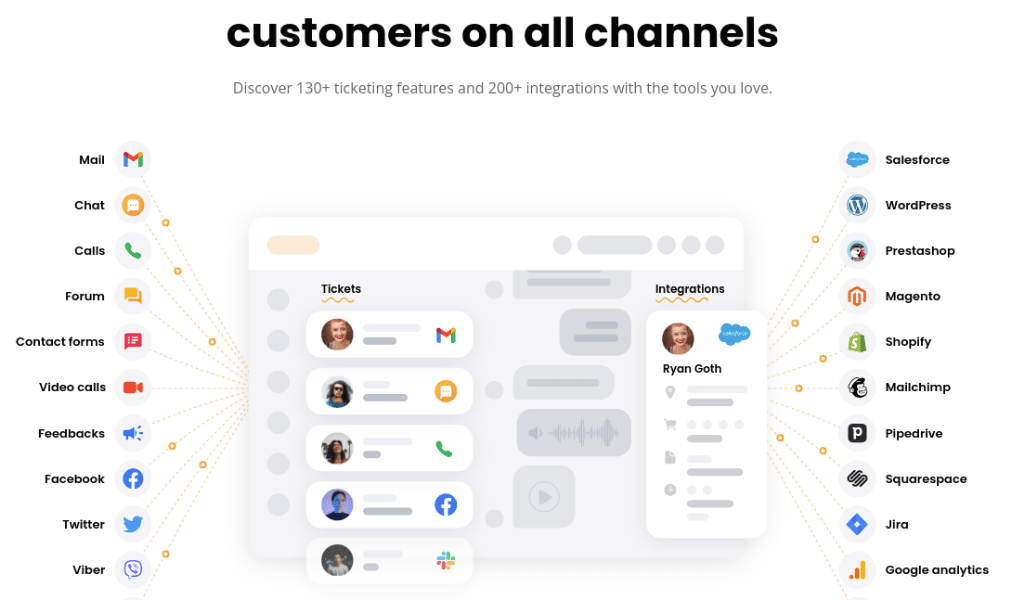
Features:
- Universal inbox
- Ticketing
- Hybrid ticket stream
- Automated ticket distribution
- Time rules
- Service level agreement
- Internal tickets
Pros:
- Numerous ways for businesses to communicate with their clients
- Automated customer service options
- Customer-facing portals are fully customizable and brandable
- Knowledgeable and helpful support team
- Simple and clear interface
- 130+ ticketing features and 200+ integrations
- Built-in CRM
Cons:
- Seems to lack proper instructions for users who are new to the tool
- Technical glitches
- The mobile app isn’t as robust
Pricing: The Free plan is available. The Ticket plan is priced at $15/agent/month, the Ticket+Chat plan is priced at $29/agent/month, the All-inclusive plan is priced at $39/agent/month.
Reviews:
“Broad functionality covers all our help desk needs in one application”- G2
“LiveAgent is a magnificent tool to help businesses in communication services. The service allows online communication to be easier than ever before and is used daily by our business.” – Capterra
4. Groove
Groove is known as a simple but powerful customer service software for businesses. A potent Zendesk alternative, Groove’s all-in-one customer service platform empowers teams to deliver speedy, high-quality, and personal support to retain customers, lower costs and generate more sales. The tool allows agents to collaborate on a single support to resolve tickets together, check who’s assigned what and who’s working on what, and respond to customers’ queries promptly on multiple platforms like Facebook, Twitter, live chat, email, phone, and text message. Businesses can also use Groove to create customer portals to enable their clients to quickly find the information they’re looking for.
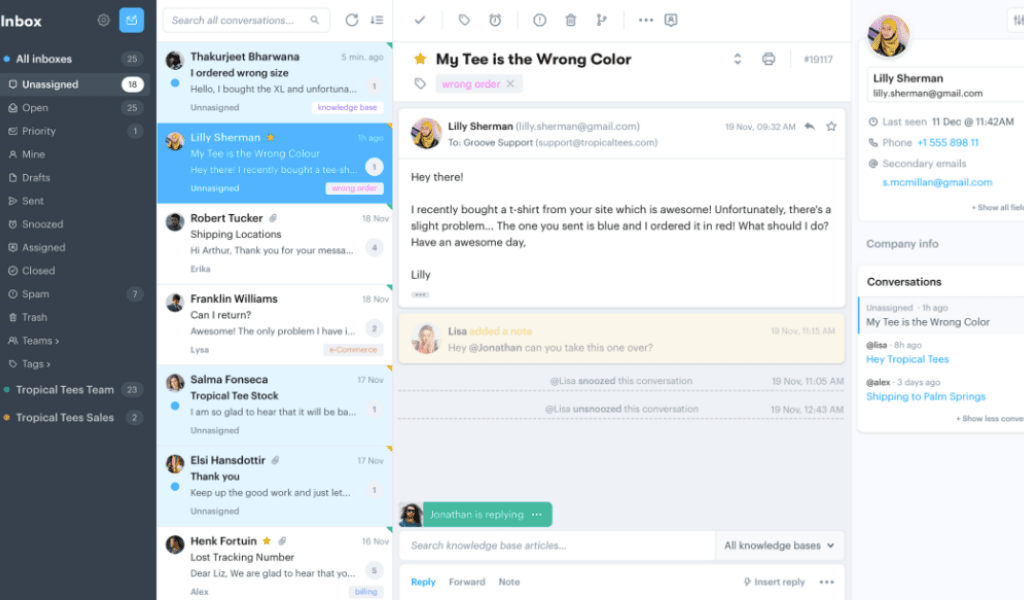
Features:
- Shared inbox
- Knowledge base
- Live chat
- Reporting
- Integrations
- Automation
Pros:
- Clean and intuitive UI
- Minimal learning curve
- Custom categories for incoming support tickets
- Set up automation
- Powerful integrations
- Ease of migrating data from the current system to Groove’s database
Cons:
- Basic reporting functions
- Customer portals are not entirely customizable
- Unduly slow
- Expensive for larger teams because of listed costs per agent
Pricing: The Starter plan is priced at $12/user/month, the Plus plan is priced at $20/user/month, the Pro plan is priced at $35/user/month, the Company plan is available on quote.
Reviews:
“The newer version no longer shows inbox ticket counts in the tab. We also can’t customize our signature lines to include our colors or logo.” – G2
“It is good to keep track of all the support requests that we get in. It’s a great way to keep on top of issues reported by clients.” – Capterra
“Connect seamlessly with your customers across various geographical locations in an instant with Group Chat in ProofHub. Send and receive DMs within seconds and reduce your customers’ waiting time. Subscribe to ProofHub NOW!”
5. ProProfs Help Desk
ProProfs Help Desk is a feature-rich and pocket-friendly Zendesk alternative that is specifically designed and created for productive teams and more-than-satisfied customers. Using a shared inbox, you and your team members can manage all your emails in one place. Loaded with advanced features, like AI-powered chatbots, team collaboration features, insightful reports, and a self-service knowledge base, ProProfs Help Desk is one of the best customer support tools for businesses of all sizes. The software makes it a breeze for support teams to acquire customer feedback through automated surveys and improved performance.
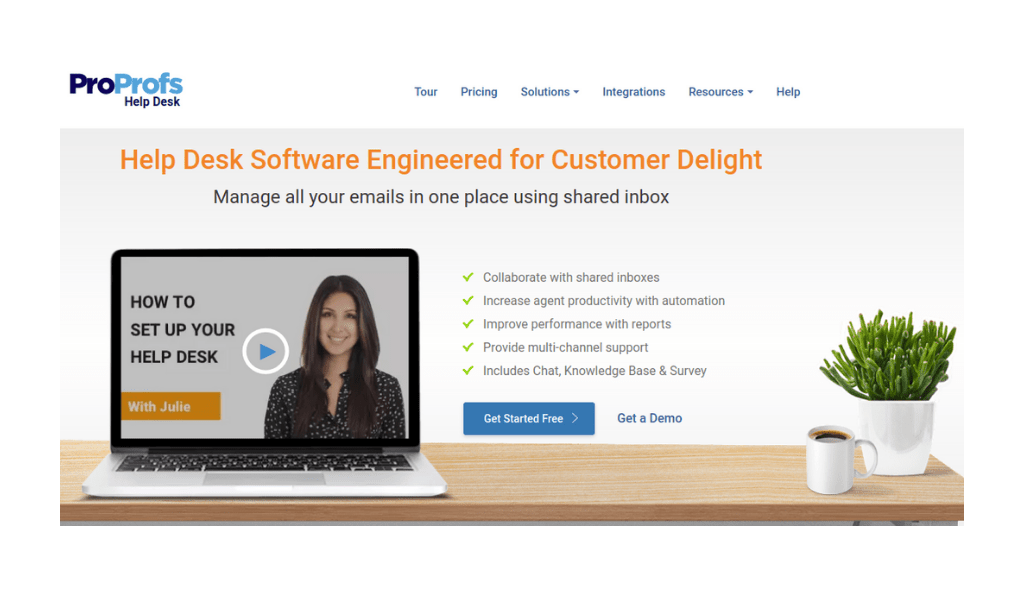
Features:
- Shared inboxes
- Advanced ticket assignment
- Reports and Analytics
- Multi-Channel support
- Customizable workflows
- Live Chat, Knowledge Base, Survey Maker
Pros:
- Centralizes shared inbox
- Creates a robust knowledge base that reduces tickets significantly
- Supports live chat
- Tracks performance
- Offers consistent online training courses to your agents
- Secure and reliable tool
Cons:
- Tickets are randomly assigned to any available agent
- Limited integrations
Pricing: Free plan is available. The Essentials plan is priced at $10/user/month. The Premium plan is priced at $15/user/month.
Reviews:
“The ability to manage all the emails from our customer-facing ids helps our agents answer them faster.” – G2
“ProProfs is a perfect customer help desk software. I love their features: shared inbox, connect support systems, customer satisfaction survey.”– Capterra
6. HubSpot Service Hub
HubSpot, well known for its CRM, sales, and marketing software, also runs a customer service program under its Service Hub suite. HubSpot offers a host of high-quality tools like ticketing, live chat, and customer surveys. All of these work flawlessly with its CRM, and since HubSpot integrates with over 800 apps and other software products, it’s easy to customize Service Hub into the tools you already use. HubSpot stands out in customization and automation, allowing you to set up alerts for different customer actions and easily take appropriate action.
Features:
- Help desk and ticketing
- VoIP Calling
- Live Chat
- Customizable knowledge base for customers
- Automate emails, responses, alerts, and more
- Third-party integrations
- Customer Portal
Pros:
- 24//7 Customer Service
- Easy to use interface
- Create customized reports
- Automated email reminders
- Fully Integrated CRM
Cons:
- Options can be overwhelming for first-time users
- Chatbox can get laggy when used with other extensions
Pricing: Free plan available. The Starter plan is priced at $45/month. The Professional plan is priced at $360/month. The Enterprise plan is priced at $1200/month.
Reviews:
“HubSpot is a gamechanger for startups looking to manage and grow their clientele.” – G2
“I’ve been working with HubSpot along with the rest of my team for 4 months and it’s only getting better. There is a LOT to explore and it’s so easy to have everything working together.” – Capterra
7. AzureDesk
AzureDesk is online customer service and a help desk ticket software for startups and small-sized growing companies. AzureDesk is counted amongst the most powerful Zendesk alternatives and focuses mainly on customer support via email through integration with the business’s current email setup. The software helps users manage customer service operations, like private notes, ticket assignment, and inline image addition to tickets. The ticket management module tags tickets based on their importance and assigns them automatically to agents. The reporting module allows users to run reports for a determined time frame and displays them in a dashboard. The tool offers integration with smooch.io, Slack, Olark, Asana, ChargeDesk, JIRA, Chalio, and Freshbooks.
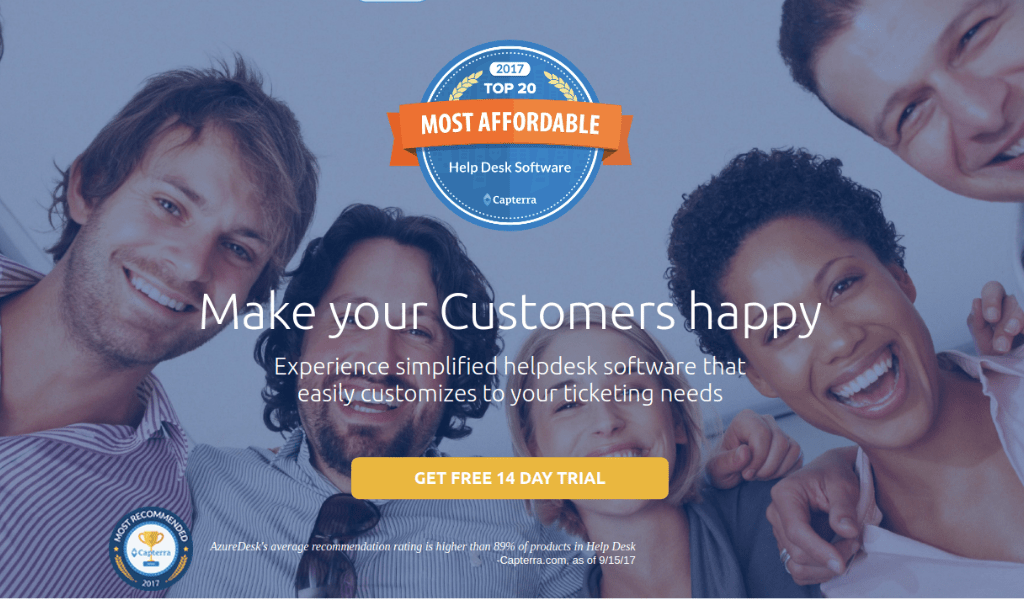
Features:
- Ticket management
- Support center
- Convert support email into tickets
- Unlimited mailbox
- Reporting
- Apps integration
Pros:
- Cloud-based, easy to use
- Quick to set up
- More streamlined than other tools
- Simple user interface
- Responsive support staff
- Keeps support tickets reasonably organized
Cons:
- Absence of multi-channel support
- Lack of advanced features
- Limited customization
- Limited reporting capabilities
Pricing: The Plus plan is priced at $33/user/month.
Reviews:
“ Software is limited to basic service desk requirements. This is a streamlined product that does what it says on the tin.” – Capterra
“Its ticket management system and the tracking of interactions is very fluid.”- G2
8. Zoho Desk
Zoho Desk is a powerful customer service software and a popular Zendesk alternative that offers more capabilities as compared to Zendesk and its competitors. Designed and built to improve customer support agent productivity, Zoho Desk offers an automation-powered ticketing system that enables an easy assignment of tickets to the right agent. Both customer support agents and customers are informed automatically about the ticket progress. “Zia”, the artificial intelligence, is one innovative and standout feature of Zoho Desk that is built for customer service teams. Zia can help customers find solutions quickly, auto-tag tickets, and suggest relevant solutions from the Knowledge Base that can be used in ticket response.
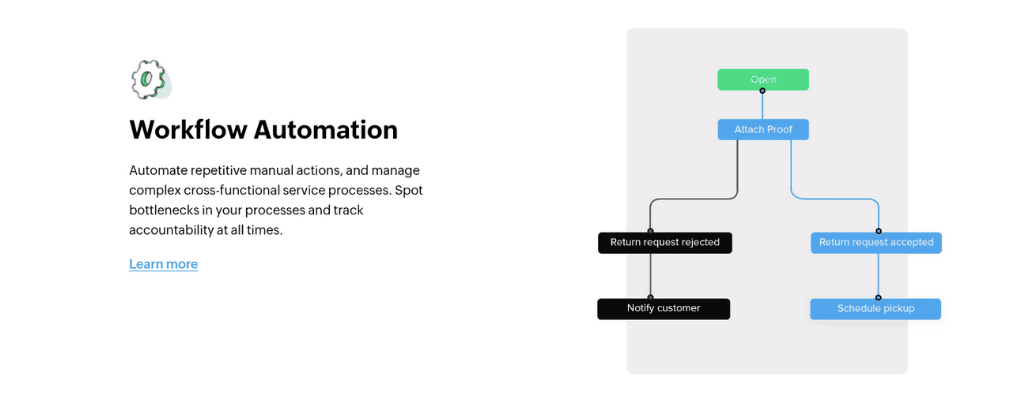
Features:
- Ticket Management
- Zia
- Self-service
- Process Automation
- Agent Productivity
- Extensibility
- Customization
- Security
- Insights and Impact
Pros:
- AI support
- Easy ticket management
- Collaborate teams effectively
- Multichannel Help Desk
- User friendly
- Social support integration
- Integrated help center approach
Cons:
- Customer support needs improvement
- Lacks compatibility on some Apple products
- Task automation needs improvement
Pricing: The Free plan is available. The Standard plan is priced at $12/agent/month, billed annually. The Professional plan is priced at $20/agent/month, billed annually. The Enterprise plan is priced at $36/agent/month, billed annually.
Reviews:
“The best part about Zoho Desk is its integrations within its own ecosystem of products and also with third-party software.”– G2
“I hated that I couldn’t sort tickets by account without creating a complex report. If you have the budget, look elsewhere.” – Capterra
9. HappyFox Help Desk
HappyFox is an all-in-one help desk ticketing system that provides faster and better support for your customers. The software is a leading Zendesk alternative and is trusted by industry-leading companies for providing exceptional customer support every day. A practical help desk and customer support software solution, HappyFox helps to eliminate chaos and streamlines your support process with a solid support ticket system, self-service knowledge base, and community forums.
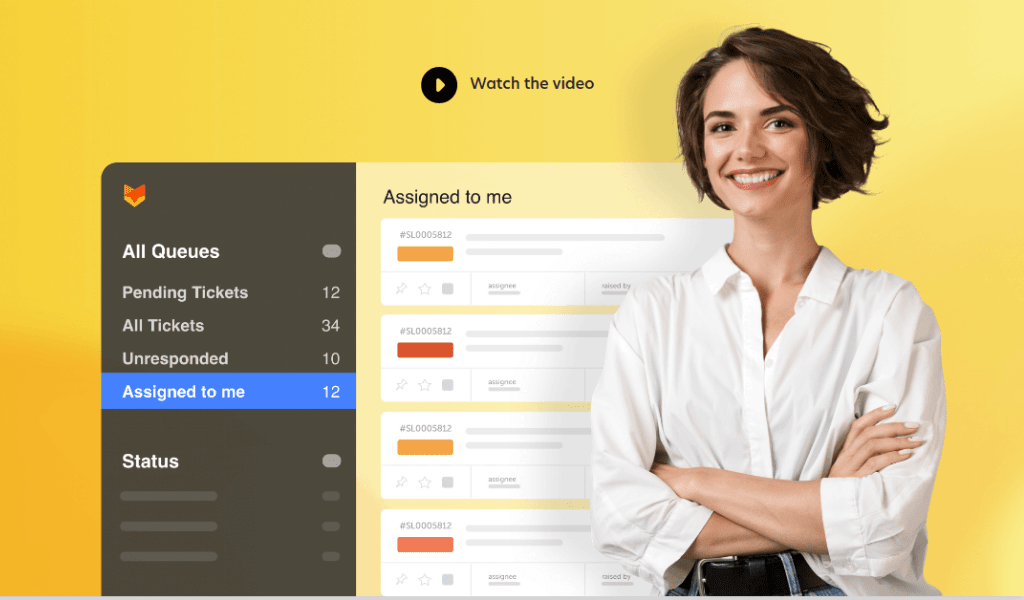
Features:
- Ticketing system
- Canned actions
- Task management
- Help desk reports
- Asset management
- Automation
- Knowledge base
- Live chat
Pros:
- Efficient ticket management system
- Easy to set up and use
- Visually pleasant, highly customizable dashboard
- In-depth reporting and analysis capability
- Assist customers from anywhere
- Flexible
Cons:
- Lack of features
- Can be expensive for startups
- Can be complex to use for less tech-savvy customers
Pricing: Pricing is available on quote.
Reviews:
“Easy to use and customize. Changed our processes for the better.” – G2
“Not easy to understand who received what (when a part of a grouping/team). Easy to get lost in the software.” – Capterra
10. Kayako
Kayako is a fully integrated cloud-hosted help desk for SMBs to immediately start supporting customers. Kayako’s help desk software has a powerful out-of-the-box functionality that empowers customer service teams to start managing requests and conversations coming through any channel. Kayako looks and functions like a ticketing system where you receive all customer requests in a shared inbox. Kayako’s live chat tool allows you to provide an engaging live chat experience 24/7. Your customer support team can help customers in real time across every channel from Kayako’s dashboard.
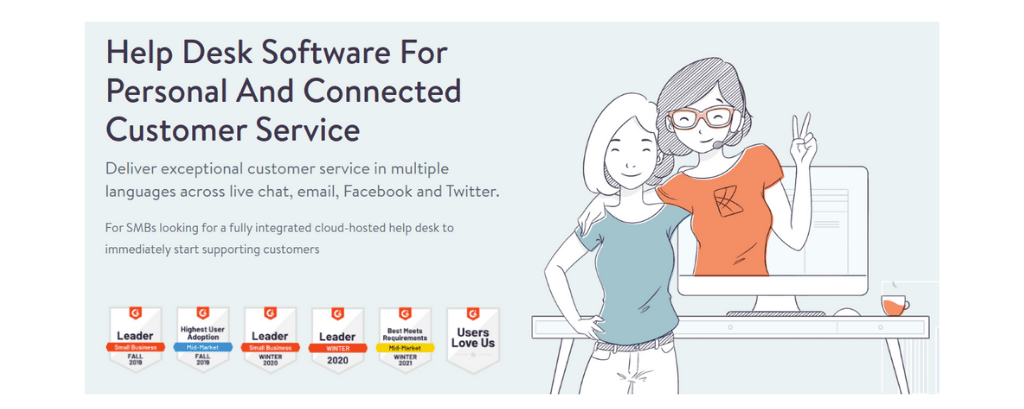
Features:
- SingleView
- Live Chat
- Collaboration
- Self Service
- Integrations
- Walkthrough
- Unified omni channel communication
- Native mobile apps for iOS and Android
- Fully customizable help center
Pros:
- Complete customer journeys in a ticket window
- intuitive, collaborative customer support platform
- Affordable
- Add collaborators for free
- Shared inbox for all customer service channels
- Context-driven customer service
- Integrates with Salesforce, Slack, Zapier, and 500 other business apps
Cons:
- No free version
- Average desk functionality and reports
- Basic live chat widget customization
- Basic knowledge base functionality
Pricing: The Inbox plan is priced at $15/agent/month. The Growth plan is priced at $30/agent/month. The Scale plan is priced at $60/agent/month.
Reviews:
“A helpful help desk in a neat little package.” – G2
“The search is not working and no results even if it should be. While replying – no possibility to see notes.”– Capterra
“Create and assign individual or group tasks for your customer support team in a single location, and set their due dates and time estimates to bring clarity. Switch to ProofHub and explore powerful features under a single roof.”
11. Intercom
Intercom is a powerful Zendesk alternative that offers several innovative features for support, sales, and marketing. These are some areas where Zendesk has been found wanting. Intercom’s customer messaging platform centers on empowering organizations to build more sustainable customer relationships at every stage of the sales funnel. Using Intercom, customer support agents can provide support through live chat, email, messaging, and push notifications. Only a handful of tools come close to the level of innovation that Intercom sets, but the software can be expensive for most if not all.
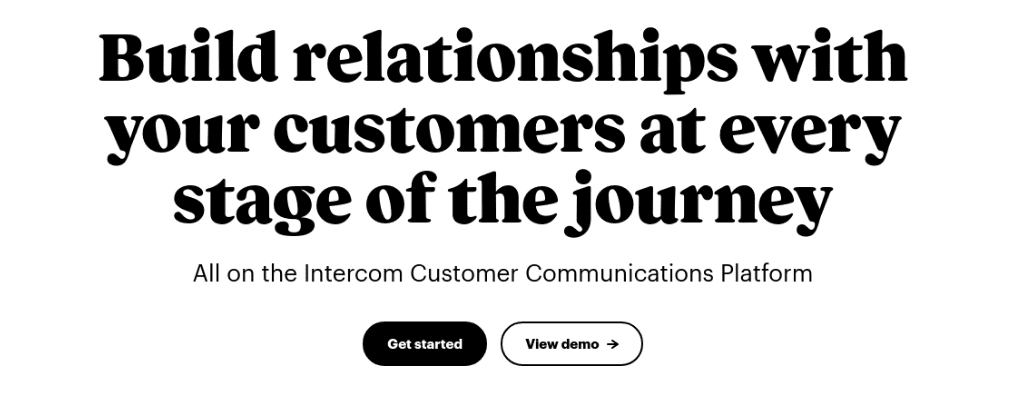
Features:
- Business messenger
- Customizable bots
- Automated answers
- Product bots
- Outbound messages
- Inbox
- Account based marketing
- Management tools
- Customer data
- Live chat
Pros:
- Incredibly easy to use
- Enhanced communication and collaboration
- Both the desktop and mobile versions of Intercom are highly functional
- Unified dashboard
- Fantastic user-experience for the end-user
- Great customer service
Cons:
- Expensive pricing plans
- Mobile app can be slow
- Not readily compatible with Xero or Freshbooks
- Users cannot change the operator icon
Pricing: For small businesses- The Starter plan is priced at $79/month. The Product tour is priced at $199/month. For other businesses- The pricing plans are available on quote.
Reviews:
“Customer service is terrible and they just don’t give two hoots about their customers. Constantly introducing new features but not actually fixing the main feature that someone would need.” – Capterra
“Perfect customer interaction and lead interaction tool.” – G2
12. TeamSupport
TeamSupport is an award-winning customer support software that is built specifically to meet the varying and unique needs of B2B technology-enabled companies across the computer hardware, software, information technology services, and telecom industries. TeamSupport offers all the right features your team needs to work as a cohesive unit and manage customer concerns on multiple channels. TeamSupport provides an omni-channel experience that improves internal team collaboration and streamlines customer support issues, which allows customer support teams to consistently deliver exceptional service.
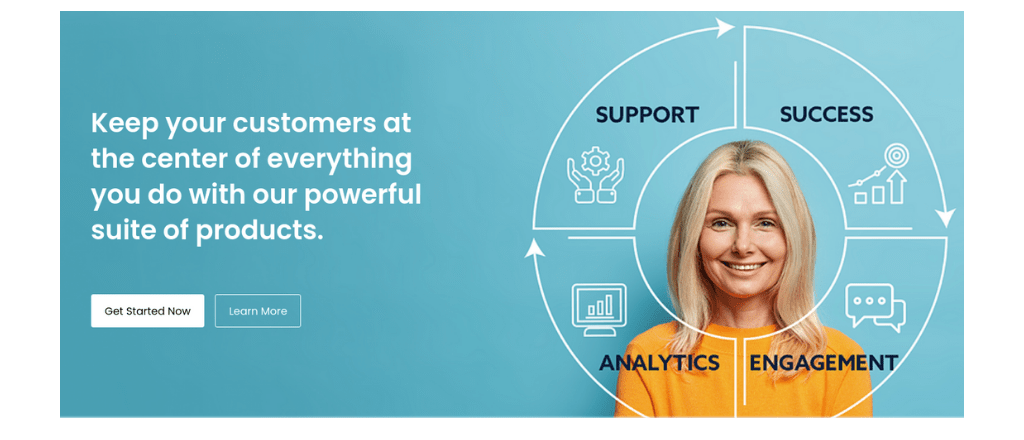
Features:
- Live Chat
- Team Insights
- Team Success
- Customer Management
- Ticket Management
- Integrations
- Collaboration and Teamwork
- Products and Inventory
- Customer Self Service
- Reporting and Analytics
Pros:
- User-friendly
- Real-time collaboration
- Powerful reporting
- Detailed interactions
- Effective ticketing system
- Easy to learn and use
- Real-time recording
Cons:
- Customizability issues
- Slow loading issues
- Less-impressive third-party integration
- Rearranged tickets
Pricing: The Support Desk plan is priced at $50/agent/month. The Enterprise plan is priced at $69/agent/month.
Reviews:
“My favorite feature of TeamSupport is the extreme customization available. User dashboards can be changed to fit their specific needs using reports, and allows for in-depth details about tickets as well as overview information.”– G2
“I love the way we can track conversations and responses in one location so it’s easy to stay up to date with all the interactions and items that need to be done.”– Capterra
Wrapping Things Up
With so many Zendesk alternatives available today, it’s not easy to pick the right tool for your customer service teams. Remember, a seemingly best Zendesk competitor may not be the right choice for you just because it is the most popular tool in the market.
You have to jot down your customer support team’s requirements and then analyze the features offered by each of these 11 alternatives to determine which tool is best suited for your customer support needs.
Your best choice would be a tool that offers you the functionalities that your customer support team currently needs. You can always upgrade later when you need to use more advanced features. Best of luck!

